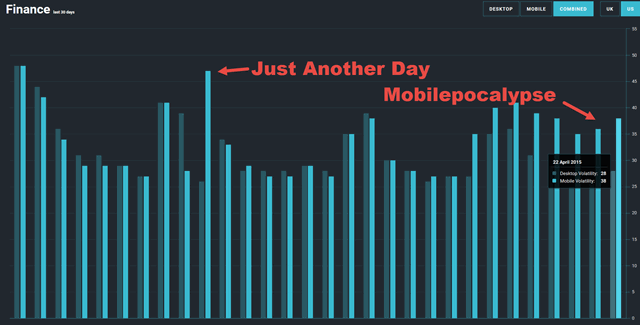Google Mobilepocalypse Update
A day after the alleged major update, I thought it would make sense to highlight where we are at in the cycle.
Yesterday Google suggested their fear messaging caused 4.7% of webmasters to move over to mobile friendly design since the update was originally announced a few months ago.
The 4.7% of the websites Google pushed to go mobile friendly likely include some sites which would have been mobile friendly anyhow by virtue of being new sites on hosted platforms with responsive designs. But for the rest of the sites, was the shift worth it?
That is a tough question.
It is too early to tell.
- Google still hasn't put much weight on it in the rankings yet.
- Mobile traffic is typically worth far less than desktop traffic for most websites.
- Time which was spent on mobile friendly conversion could have been spent on other forms of marketing.
- Some sites which became mobile friendly took a significant revenue hit in doing so by switching out long running effective ad placements with mobile responsive units which may not have performed as well.
The problem with going early is you eat the expense upfront, while the rewards are still unknown.
- Many people who jumped on the "secured everywhere" bandwagon last year saw broken security certificate issues and broken plugins which were hard to fix. And the upfront cost wasn't the only expense, as many AdSense publishers saw less relevant ads, lower ad CTR, and a sharp drop in AdSense earnings after going secured.
- Those who spent the money to integrate Google Checkout to get AdWords discounts had to spend again to remove it when Google stopped supporting it.
- TV makers who were early to integrate Google's YouTube API (which allowed ad free streaming) will now have to deal with a rash of customer complaints as Google sunsets the old API to make way to be able to sell an ad free subscription service.
If you are spending your own time & money and you believe in what you are doing and the longevity of a project then it doesn't matter too much if the rewards come slowly or never come. A sense of purpose & a sense of pride in your work is a form of payment.
However, if you are spending a client's money & you ring a 5 alarm fire to rush to make some technical change & then see no upside after the much hyped announcement, that erodes client trust. If there is no upside and a huge drop in revenue, then the consultant looks like a clueless idiot burning money for the sake of it doing various make work projects.
A few years ago a Google rep stated Panda would be folded into the regular algorithms. Then recently we were told it was a near realtime. Then we were told it was something where updates needed to be manually pushed out & it is something Google hasn't done in 4 months. If we trusted Google & conveyed any of these messages to clients, once again we looked like idiots. If we choose to invest client money based on the cycles and advice we are given, quite often that is a money incinerator.
Imagine dropping $30,000 on a link cleanup project where you remove links which were helping your Bing rankings but the Google update "coming soon" takes over a year to show up.
Invest money to lower your current income while you're waiting for Godat.
Good times!
So after Google made a big show of this pending mobile update by pre-announcing it, speaking about it at multiple conferences, comparing it to Panda and Penguin & stating it would have a bigger impact, sending out millions of warning messages via Webmaster Tools, etc etc etc .. when the big day came, did Google make the people who trusted them & invested in their advice look good?
Not so much.
Ayima recently launched a SERP flux pulse tracker tool which shows desktop and mobile flux side-by-side.

As you can see, nothing happened.

So far, no rewards. Maybe they will come. Though here is a hypothetical example where it could be very much NOT worth it for some publishers to go mobile friendly...
- a webmaster managing an affiliate site converts it to a mobile responsive design
- but user conversions on mobile devices in some verticals are unlikely, due to it being a pain in the ass to enter credit card info and so on ...
- well ... person makes their site mobile friendly
- that leads their mobile version of their site to rank better in Google
- that leads to a greater share of their overall organic Google search traffic coming from mobile devices
- their engagement metrics on mobile are somewhat weak, particularly when compared against desktop users, as is the case for many websites
- their lower aggregate engagement metrics could create a signal which lead an edge case site into a false positive panda penalty
- that then lowers their desktop search rankings
- which lowers their desktop search traffic
- which lowers their desktop search revenues
- ...worse yet, ...
- those affiliate cookies they dropped on mobile devices don't count for them when the user later converts on a desktop device
Any form of penalty (even a false positive) can become self-reinforcing. And many of the things which seem like they might help could cause harm.
Did you jump the gun or wait and see?

0 Comments:
Post a Comment
Subscribe to Post Comments [Atom]
<< Home